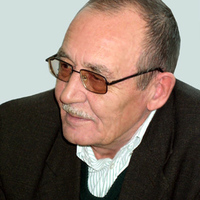
Владимир Ламин
Related Authors
Mihail Bazanov
Chelyabinsk State University
Yasyn Abdullaev
University of California, Berkeley
Andrei Keller
Ural Federal University
Darya Ryapusova
Ural Branch of Russian Academy of Sciences
Sergey Vorobyev
Ural Branch of Russian Academy of Sciences
Andrey Speransky
Ural Branch of Russian Academy of Sciences
Mikhail Weber
Ural Branch of Russian Academy of Sciences
Sergey Kovalevskiy
Kuzbass State Technical University
Кузнецов Виктор
Ural Branch of Russian Academy of Sciences
Interests









Uploads
Papers by Владимир Ламин
The paper shows the role of the program for establishing the Ural-Kuznetsk Works which became the driving force of the social and economic development of the eastern territories in the 20th century. The program was implemented primarily in the 1930-40-s and had both directly and indirectly affected major part of the territory of the European and Asian parts of Russia. The establishing and strengthening of the UKW was a major modernization breakthrough and the critical factor in the formation of industrial and urban society in the Ural-Siberian region.
The article presents in the historical retrospect the role of the transportation communications in the development of Siberia, emphasizing that the transport routes had a significant effect upon the social and the economic development of the region, facilitated migration into the new territories and the spread of agriculture. Of a particular pioneer importance was the railway construction, which predetermined the modern backbone of the Siberian transportation system, acquiring the ever more global nature and making its contribution to the shaping of the global economic environment.
Предлагаемая вниманию читателей статья – это очерк истории наиболее значимых процессов и событий, которыми в последние 20 лет чаще всего оперируют конструкторы будущего отделения России от Сибири.
Ключевые слова: проекты, дискуссия, освоение Севера, Россия, железнодорожное строительство, концессионная политика.
The article presents a historical reconstruction of the formation and development of russian transport system. The one of it imperatives in the XVII century became a searching of the sea and land-river trading route to India. The expeditionary researches of these routes initiated the development of far regions of Siberia and northern areas of the country,which had economic and strategic importance.
В Институте истории СО РАН с успехом прошла очередная конференция, посвящённая памяти академика Н.Н. Покровского. Николай Николаевич в течение десятилетий вел огромную работу по изучению истории Сибири, православия и книжной культуры, Русской православной церкви и старообрядчества, был крупным организатором сибирской археографии (в том числе полевой) и уникальным специалистом в области источниковедения, разработал продуктивную методику исследования источников, оказал заметное влияние на развитие современной исторической науки, создал научную школу.
В статье дается анализ интеграционных процессов в музейном мире Сибири, научно-организационной деятельности Института истории СО РАН в области освоения научного и историко-культурного наследия, эффективности и перспектив взаимодействия образовательных (Алтайский государственный педагогический университет), исследовательских (АНО «Новый институт культурологии») и общественных музеологических организаций (Научный совет по музеям СО РАН, Комитет музеологии стран Азии и Тихо-океанского региона – АСПАК) в сфере наследиеведения.
The paper shows the role of the program for establishing the Ural-Kuznetsk Works which became the driving force of the social and economic development of the eastern territories in the 20th century. The program was implemented primarily in the 1930-40-s and had both directly and indirectly affected major part of the territory of the European and Asian parts of Russia. The establishing and strengthening of the UKW was a major modernization breakthrough and the critical factor in the formation of industrial and urban society in the Ural-Siberian region.
The article presents in the historical retrospect the role of the transportation communications in the development of Siberia, emphasizing that the transport routes had a significant effect upon the social and the economic development of the region, facilitated migration into the new territories and the spread of agriculture. Of a particular pioneer importance was the railway construction, which predetermined the modern backbone of the Siberian transportation system, acquiring the ever more global nature and making its contribution to the shaping of the global economic environment.
Предлагаемая вниманию читателей статья – это очерк истории наиболее значимых процессов и событий, которыми в последние 20 лет чаще всего оперируют конструкторы будущего отделения России от Сибири.
Ключевые слова: проекты, дискуссия, освоение Севера, Россия, железнодорожное строительство, концессионная политика.
The article presents a historical reconstruction of the formation and development of russian transport system. The one of it imperatives in the XVII century became a searching of the sea and land-river trading route to India. The expeditionary researches of these routes initiated the development of far regions of Siberia and northern areas of the country,which had economic and strategic importance.
В Институте истории СО РАН с успехом прошла очередная конференция, посвящённая памяти академика Н.Н. Покровского. Николай Николаевич в течение десятилетий вел огромную работу по изучению истории Сибири, православия и книжной культуры, Русской православной церкви и старообрядчества, был крупным организатором сибирской археографии (в том числе полевой) и уникальным специалистом в области источниковедения, разработал продуктивную методику исследования источников, оказал заметное влияние на развитие современной исторической науки, создал научную школу.
В статье дается анализ интеграционных процессов в музейном мире Сибири, научно-организационной деятельности Института истории СО РАН в области освоения научного и историко-культурного наследия, эффективности и перспектив взаимодействия образовательных (Алтайский государственный педагогический университет), исследовательских (АНО «Новый институт культурологии») и общественных музеологических организаций (Научный совет по музеям СО РАН, Комитет музеологии стран Азии и Тихо-океанского региона – АСПАК) в сфере наследиеведения.